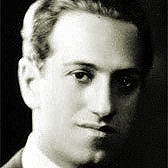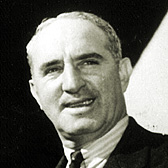Acclaimed lyricist and librettist for 50 musicals
Otto Harbach
InducteeKey collaborator of Gershwin, Kern and Hammerstein
Otto Abels Harbach was born in Salt Lake City, Utah on August 18, 1873. The lyricist of such notable standards as “Smoke Gets in Your Eyes”, “No, No, Nanette”, “The Desert Song” and “Indian Love Call”, did not begin writing songs until his mid thirties. After graduating from Knox College in 1895, where he earned his BA, MA and DHL, Harbach embarked on several career ventures. From 1895 through 1901, he served as a Professor of English at Columbia University and Whitman College; 1902 until 1903, he was a New York City newspaper writer; 1903 through 1910, he worked for advertising agencies.
It was while working as a young advertising executive that Harbach met composer Karl Hoschna and the two began collaborating on songs for vaudeville and minstrel acts. The team achieved mild success and Harbach left all other vocations to devote himself to writing for Broadway productions.
Working as lyricist, and often librettist as well, Harbach would collaborate on such productions as Three Twins, Madame Sherry, The Firefly, High Jinks, Katinka, Going Up, Tumble In, The Little Whopper, The Cat and the Fiddle, Roberta, You’re in Love, Tickle Me!, Mary, The O’Brien Girl, The Blue Kitten, Molly Darling, Wildflower, Rose-Marie, No, No, Nanette, Sunny, Song of the Flame, Criss-Cross, The Desert Song, Gold Dawn, The Crinoline Girl, Nina Rosa, Kid Boots, Kitty’s Kisses, Oh, Please!, Good Boy and several others. He also co-authored the play Up in Mabel’s Room.
In 1914, another phase of Harbach’s songwriting career began with the founding of the American Society for Authors, Composers and Publishers (ASCAP). He was a charter member of the new society and would remain actively involved serving as a director (1920-1963), vice president (1936-1940) and president (1950-1953).
Harbach collaborated with the best songwriters of his time, including Oscar Hammerstein II, Rudolf Friml, Jerome Kern, L. Wolfe Gilbert, Louis Hirsch, Herbert Stothart, Vincent Youmans, George Gershwin and Sigmund Romberg.
Other highlights from the Harbach catalog include “Cuddle Up a Little Closer”, “Lovey Mine”, “Every Little Movement Has a Meaning All Its Own”, “Giannina Mia”, “When a Maid Comes Knocking at Your Heart”, “Love is Like a Firefly”, “Sympathy”, “Something Seems Tingle-ing-eling”, “Katinka”, “Not Now but Later”, “Allah’s Holiday”, “Rackety Koo”, “The Tickle Toe”, “Going Up”, “The Love Nest”, “Mary”, “Cutie”, “Wild-flower”, “Bambalina”, “Rose-Marie”, “The Mounties”, “Totem Tom-Tom”, “I’ve Confessed to the Breeze”, “Sunny”, “Who?”, “Two Little Bluebirds”, “D’Ye Love Me?”, “Cossack Love Song”, “Song of the Flame”, “Riff Song”, “Romance”, “One Alone”, “One Flower Grows Alone in Your Garden”, “The Night Was Made for Love”, “She Didn’t Say ‘Yes’”, “One Moment Alone”, “Try to Forget”, “A New Love is Old”, “I Watch the Love Parade”, “You’re Devastating”, “Yesterdays”, “The Touch of Your Hand”, “I Won’t Dance” and “Your Dream”.
While several of the Broadway shows Harbach worked on were made into Hollywood Musicals, the lyricist never moved to Hollywood for the studio incarnations, as did so many of his counterparts. He was committed to the stage and was one of the most successful lyricist and librettists in Broadway history.
Otto A. Harbach died in New York City on January 24, 1963.








